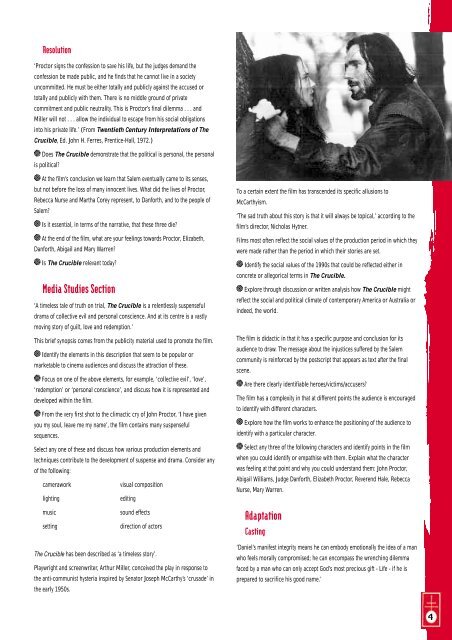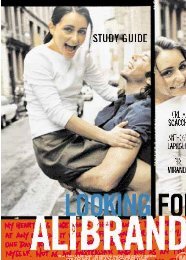The crucible - Saint Ignatius' Moodle Community
The crucible - Saint Ignatius' Moodle Community
The crucible - Saint Ignatius' Moodle Community
Create successful ePaper yourself
Turn your PDF publications into a flip-book with our unique Google optimized e-Paper software.
Resolution<br />
‘Proctor signs the confession to save his life, but the judges demand the<br />
confession be made public, and he finds that he cannot live in a society<br />
uncommitted. He must be either totally and publicly against the accused or<br />
totally and publicly with them. <strong>The</strong>re is no middle ground of private<br />
commitment and public neutrality. This is Proctor’s final dilemma . . . and<br />
Miller will not . . . allow the individual to escape from his social obligations<br />
into his private life.’ (From Twentieth Century Interpretations of <strong>The</strong><br />
Crucible, Ed. John H. Ferres, Prentice-Hall, 1972.)<br />
Does <strong>The</strong> Crucible demonstrate that the political is personal, the personal<br />
is political?<br />
At the film’s conclusion we learn that Salem eventually came to its senses,<br />
but not before the loss of many innocent lives. What did the lives of Proctor,<br />
Rebecca Nurse and Martha Corey represent, to Danforth, and to the people of<br />
Salem?<br />
Is it essential, in terms of the narrative, that these three die?<br />
At the end of the film, what are your feelings towards Proctor, Elizabeth,<br />
Danforth, Abigail and Mary Warren?<br />
Is <strong>The</strong> Crucible relevant today?<br />
Media Studies Section<br />
‘A timeless tale of truth on trial, <strong>The</strong> Crucible is a relentlessly suspenseful<br />
drama of collective evil and personal conscience. And at its centre is a vastly<br />
moving story of guilt, love and redemption.’<br />
This brief synopsis comes from the publicity material used to promote the film.<br />
Identify the elements in this description that seem to be popular or<br />
marketable to cinema audiences and discuss the attraction of these.<br />
Focus on one of the above elements, for example, ‘collective evil’, ‘love’,<br />
‘redemption’ or ‘personal conscience’, and discuss how it is represented and<br />
developed within the film.<br />
From the very first shot to the climactic cry of John Proctor, ‘I have given<br />
you my soul, leave me my name’, the film contains many suspenseful<br />
sequences.<br />
Select any one of these and discuss how various production elements and<br />
techniques contribute to the development of suspense and drama. Consider any<br />
of the following:<br />
camerawork<br />
lighting<br />
music<br />
setting<br />
visual composition<br />
editing<br />
sound effects<br />
direction of actors<br />
<strong>The</strong> Crucible has been described as ‘a timeless story’.<br />
Playwright and screenwriter, Arthur Miller, conceived the play in response to<br />
the anti-communist hysteria inspired by Senator Joseph McCarthy’s ‘crusade’ in<br />
the early 1950s.<br />
To a certain extent the film has transcended its specific allusions to<br />
McCarthyism.<br />
‘<strong>The</strong> sad truth about this story is that it will always be topical,’ according to the<br />
film’s director, Nicholas Hytner.<br />
Films most often reflect the social values of the production period in which they<br />
were made rather than the period in which their stories are set.<br />
Identify the social values of the 1990s that could be reflected either in<br />
concrete or allegorical terms in <strong>The</strong> Crucible.<br />
Explore through discussion or written analysis how <strong>The</strong> Crucible might<br />
reflect the social and political climate of contemporary America or Australia or<br />
indeed, the world.<br />
<strong>The</strong> film is didactic in that it has a specific purpose and conclusion for its<br />
audience to draw. <strong>The</strong> message about the injustices suffered by the Salem<br />
community is reinforced by the postscript that appears as text after the final<br />
scene.<br />
Are there clearly identifiable heroes/victims/accusers?<br />
<strong>The</strong> film has a complexity in that at different points the audience is encouraged<br />
to identify with different characters.<br />
Explore how the film works to enhance the positioning of the audience to<br />
identify with a particular character.<br />
Select any three of the following characters and identify points in the film<br />
when you could identify or empathise with them. Explain what the character<br />
was feeling at that point and why you could understand them: John Proctor,<br />
Abigail Williams, Judge Danforth, Elizabeth Proctor, Reverend Hale, Rebecca<br />
Nurse, Mary Warren.<br />
Adaptation<br />
Casting<br />
‘Daniel’s manifest integrity means he can embody emotionally the idea of a man<br />
who feels morally compromised; he can encompass the wrenching dilemma<br />
faced by a man who can only accept God’s most precious gift - Life - if he is<br />
prepared to sacrifice his good name.’<br />
4







